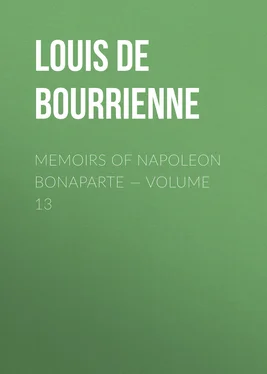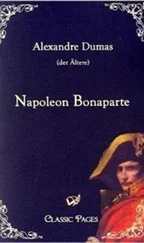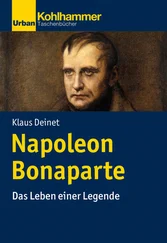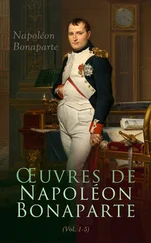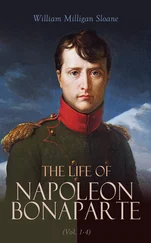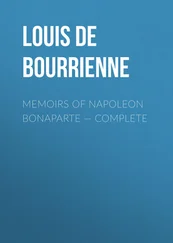Louis Bourrienne - Memoirs of Napoleon Bonaparte — Volume 13
Здесь есть возможность читать онлайн «Louis Bourrienne - Memoirs of Napoleon Bonaparte — Volume 13» — ознакомительный отрывок электронной книги совершенно бесплатно, а после прочтения отрывка купить полную версию. В некоторых случаях можно слушать аудио, скачать через торрент в формате fb2 и присутствует краткое содержание. Жанр: Биографии и Мемуары, История, foreign_edu, foreign_antique, foreign_prose, на английском языке. Описание произведения, (предисловие) а так же отзывы посетителей доступны на портале библиотеки ЛибКат.
- Название:Memoirs of Napoleon Bonaparte — Volume 13
- Автор:
- Жанр:
- Год:неизвестен
- ISBN:нет данных
- Рейтинг книги:3 / 5. Голосов: 1
-
Избранное:Добавить в избранное
- Отзывы:
-
Ваша оценка:
- 60
- 1
- 2
- 3
- 4
- 5
Memoirs of Napoleon Bonaparte — Volume 13: краткое содержание, описание и аннотация
Предлагаем к чтению аннотацию, описание, краткое содержание или предисловие (зависит от того, что написал сам автор книги «Memoirs of Napoleon Bonaparte — Volume 13»). Если вы не нашли необходимую информацию о книге — напишите в комментариях, мы постараемся отыскать её.
Memoirs of Napoleon Bonaparte — Volume 13 — читать онлайн ознакомительный отрывок
Ниже представлен текст книги, разбитый по страницам. Система сохранения места последней прочитанной страницы, позволяет с удобством читать онлайн бесплатно книгу «Memoirs of Napoleon Bonaparte — Volume 13», без необходимости каждый раз заново искать на чём Вы остановились. Поставьте закладку, и сможете в любой момент перейти на страницу, на которой закончили чтение.
Интервал:
Закладка:
This remark promised much. The Comte Artois next proceeded on horseback to the barrier St. Martin. I mingled in the crowd to see the procession and to observe the sentiments of the spectators. Near me stood an old knight of St. Louis, who had resumed the insignia of the order, and who wept for joy at again seeing one of the Bourbons. The procession soon arrived, preceded by a band playing the air, "Vive Henri Quatre!" I had never before seen Monsieur, and his appearance had a most pleasing effect upon me. His open countenance bore the expression of that confidence which his presence inspired in all who saw him. His staff was very brilliant, considering it was got together without preparation. The Prince wore the uniform of the National Guard, with the insignia of the Order of the Holy Ghost.
I must candidly state that where I saw Monsieur pass, enthusiasm was chiefly confined to his own retinue, and to persons who appeared to belong to a superior class of society. The lower order of people seemed to be animated by curiosity and astonishment rather than any other feeling. I must add that it was not without painful surprise I saw a squadron of Cossacks close the procession; and my surprise was the greater when I learned from General Sacken that the Emperor Alexander had wished that on that day the one Frenchman more should be surrounded only by Frenchmen, and that to prove that the presence of the Bourbons was the signal of reconciliation his Majesty had ordered 20,000 of the Allied troops to quit Paris. I know not to what the presence of the Cossacks is to be attributed, but it was an awkward circumstance at the time, and one which malevolence did not fail to seize upon.
Two days only intervened between Monsieur's entrance into Paris and the arrival of the Emperor of Austria. That monarch was not popular among the Parisians. The line of conduct he had adopted was almost generally condemned, for, even among those who lead most ardently wished for the dethronement of his daughter, through their aversion to the Bonaparte family, there were many who blamed the Emperor of Austria's behaviour to Maria Louisa: they would have wished that, for the honour of Francis II., he had unsuccessfully opposed the downfall of the dynasty, whose alliance he considered as a safeguard in 1809. This was the opinion which the mass of the people instinctively formed, for they judged of the Emperor of Austria in his character of a father and not in his character of a monarch; and as the rights of misfortune are always sacred in France, more interest was felt for Maria Louisa when she was known to be forsaken than when she was in the height of her splendour. Francis II. had not seen his daughter since the day when she left Vienna to unite her destiny with that of the master of half of Europe, and I have already stated how he received the mission with which Maria Louisa entrusted the Duc de Cadore.
I was then too intent on what was passing in Paris and at Fontainebleau to observe with equal interest all the circumstances connected with the fate of Maria Louisa, but I will present to the reader all the information I was able to collect respecting that Princess during the period immediately preceding her departure from France. She constantly assured the persons about her that she could rely on her father. The following words, which were faithfully reported to me, were addressed by her to an officer who was at Blois during the mission of M. de Champagny. "Even though it should be the intention of the Allied sovereigns to dethrone the Emperor Napoleon, my father will not suffer it. When he placed me on the throne of France he repeated to me twenty times his determination to uphold me on it; and my father is an honest man." I also know that the Empress, both at Blois and at Orleans, expressed her regret at not having followed the advice of the members of the Regency, who wished her to stay in Paris.
On leaving Orleans Maria Louisa proceeded to Rambouillet; and it was not one of the least extraordinary circumstances of that eventful period to see the sovereigns of Europe, the dethroned sovereigns of France, and those who had come to resume the sceptre, all crowded together within a circle of fifteen leagues round the capital. There was a Bourbon at the Tuileries, Bonaparte at Fontainebleau, his wife and son at Rambouillet, the repudiated Empress at Malmaison three leagues distant, and the Emperors of Russia and Austria and the King of Prussia in Paris.
When all her hopes had vanished Maria Louisa left Rambouillet to return to Austria with her son. She did not obtain permission to see Napoleon before her departure, though she had frequently expressed a wish to that effect. Napoleon himself was aware of the embarrassment which might have attended such a farewell, or otherwise he would no doubt have made a parting interview with Maria Louisa one of the clauses of the treaty of Paris and Fontainebleau, and of his definitive act of abdication. I was informed at the time that the reason which prevented Maria Louisa's wish from being acceded to was the fear that, by one of those sudden impulses common to women, she might have determined to unite herself to Napoleon's fallen fortune, and accompany him to Elba; and the Emperor of Austria wished to have his daughter back again.
Things had arrived at this point, and there was no possibility of retracting from any of the decisions which had been formed when the Emperor of Austria went to see his daughter at Rambouillet. I recollect it was thought extraordinary at the time that the Emperor Alexander should accompany him on this visit; and, indeed, the sight of the sovereign, who was regarded as the head and arbiter of the coalition, could not be agreeable to the dethroned Empress.
—[ Meneval (tome ii. p. 112), then with Maria Louisa as Secretary, who gives some details of her interview with the Emperor Francis on the 16th of April, says nothing about the Czar having been there; a fact he would have been sure to have remarked upon. It was only on the 19th of April that Alexander visited her, the King of Prussia coming in his turn on the 22d; but Bourrienne is right in saying that Maria Louisa complained bitterly of having to receive Alexander, and considered that she was forced by her father to do so. The poor little King of Rome, then only three years old, had also to be seen by the monarchs. He was not taken with his grandfather, remarking that he was not handsome. Maria Louisa seems, according to Meneval, to have been at this time really anxious to join Napoleon (Meneval, tome ii. p. 94). She left Rambouillet on the 28d of April stopped one day at Grossbois, receiving there her father and Berthier, and taking farewell of several persons who came from Paris for that purpose. On the 25th of April she started for Vienna, and later for Parma, which state she received under the treaty of 1814 and 1815. She yielded to the influence brought to bear on her, became estranged from Napoleon, and eventually married her chamberlain, the Comte de Neipperg, an Austrian general.]—
The two Emperors set off from Paris shortly after each other. The Emperor of Austria arrived first at Rambouillet, where he was received with respect and affection by his daughter. Maria Louisa was happy to see him, but the many tears she shed were not all tears of joy. After the first effusion of filial affection she complained of the situation to which she was reduced. Her father sympathised with her, but could offer her no consolution, since her misfortunes were irreparable. Alexander was expected to arrive immediately, and the Emperor of Austria therefore informed his daughter that the Russian monarch wished to see her. At first Maria Louisa decidedly refused to receive him, and she persisted for some time in this resolution. She said to her father, "Would he too make me a prisoner before your eyes? If he enters here by force I will retire to my chamber. There, I presume, he will not dare to follow me while you are here." But there was no time to be lost; Francis II. heard the equipage of the Emperor of Russia rolling through the courtyard of Rambouillet, and his entreaties to his daughter became more and more urgent. At length she yielded, and the Emperor of Austria went himself to meet his ally and conduct him to the salon where Maria Louisa remained, in deference to her father. She did not, however, carry her deference so far as to give a favourable reception to him whom she regarded as the author of all her misfortunes. She listened with considerable coldness to the offers and protestations of Alexander, and merely replied that all she wished for was the liberty of returning to her family. A few days after this painful interview Maria Louisa and her son set off for Vienna.
Читать дальшеИнтервал:
Закладка:
Похожие книги на «Memoirs of Napoleon Bonaparte — Volume 13»
Представляем Вашему вниманию похожие книги на «Memoirs of Napoleon Bonaparte — Volume 13» списком для выбора. Мы отобрали схожую по названию и смыслу литературу в надежде предоставить читателям больше вариантов отыскать новые, интересные, ещё непрочитанные произведения.
Обсуждение, отзывы о книге «Memoirs of Napoleon Bonaparte — Volume 13» и просто собственные мнения читателей. Оставьте ваши комментарии, напишите, что Вы думаете о произведении, его смысле или главных героях. Укажите что конкретно понравилось, а что нет, и почему Вы так считаете.
